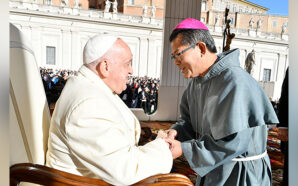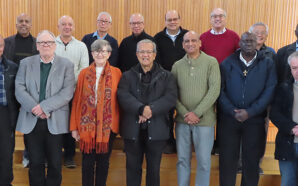Bishop Vincent Long OFM Conv, Bishop of Parramatta – Address to Catholic Education Diocese of Parramatta System Leadership Day, Rosehill Racecourse, 25 January 2018
Forming students and communities for the Reign of God
Part 4: Catholic education is an expression of God’s radical love
Pope Francis said the following in one of his addresses to Catholic educators and he pulls no punches:
“Education has become too selective and elitist. It seems that only those people or persons who are at a certain level or have a certain capacity have the right to an education. This is shameful. It is a reality which takes us in a direction of human selectivity. Instead of bridging the gap between people, it widens it. It creates a barrier between poor and rich.
The greatest failure for an education is to educate within the walls: the walls of selective culture, the walls of a culture of security, the walls of a social class.
We cannot go on like this with a selective type of education. No one should be denied. We must leave the places where we are as educators and go to the outskirts, to the poor.”
Catholic schools find their authenticity in the Gospel priorities of inclusion and special concern for young people at risk of being left behind. We are not schools that provide education for Catholics only but Catholic education for all.
Inclusive education should be one of the hallmarks of our Diocese. Our schools are called to be open to all who seek the values of our gospel, regardless of religious affiliation or financial capacity. We accept that we cannot fully claim the title ‘Catholic’ without this commitment. We cannot fully claim to be a school for all when poor families are excluded on account of their inability to pay fees. In a society that increasingly sees education as a commodity that can be bought, our schools risk being used as vehicles for socio-differentiation and elitism, we may have become schools of choice for those people who aspire to exclusive, private education
Pope Francis uses a rather unconventional term to describe the church. He famously says that pastors need to wear the scent of the sheep. Then he describes the Church as a field hospital that treats the wounded after the battle. “The thing the Church needs most today is the ability to heal wounds and to warm the hearts of the faithful; it needs nearness, proximity”. That is his vision of the ideal Church. Not a perfect society, nor the enclosure for the privileged but a refuge for the poor, an oasis for the weary and a hospital for the wounded.
The field hospital is not concerned about defending against threat of encroachment and loss of its status and privileges. Instead, it goes out of itself to respond to the needs of those whose lives are at risk. It engages with the world rather than withdraws into enclaves. Our desire to be countercultural witness should not imprison us in a ghetto. Indeed, as Pope Francis reminded us, we need to be in prisons, hospitals, the streets, villages, factories. If this is not so, the Church will be an institution of the exclusive that does not say anything to anyone, not even to the Church herself.
I dream of a Church that dares to break new ground with a view to being radically faithful to the inclusive vision of Jesus. For he has a habit of challenging ingrained stereotyped attitudes, subverting the tyranny of the majority, breaking social taboos, pushing the boundaries of love and redefining its meaning. His interactions with women, with tax collectors and other types of social outcast are nothing short of being revolutionary and boundary breaking. Think of the way he reinterpreted the meaning of a neighbour.
In the Old Testament, a neighbour often means a male comrade member of the covenant community. Thus, for example, we can understand the commandment not to covet your neighbour’s wife, because it refers to the rights of the neighbour. Jesus pushes the envelope further. Indeed, he turns the normative concept of neighbour upside down through the Parable of the Good Samaritan. It is his radical vision of love, inclusion and human flourishing that ought to guide the way we educate and form our students.
Part 5 will be published tomorrow.
To read Part 3 of Bishop Vincent’s address, click here.








